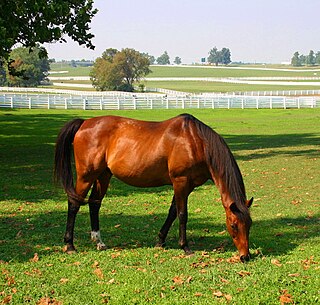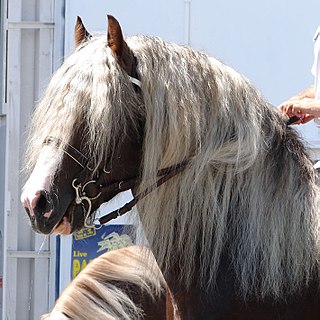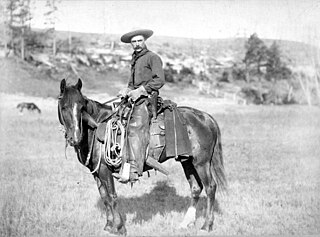
The American Quarter Horse, or Quarter Horse, is an American breed of horse that excels at sprinting short distances. Its name is derived from its ability to outrun other horse breeds in races of a quarter mile or less; some have been clocked at speeds up to 56 mph (70.8 km/h). The development of the Quarter Horse traces to the 1600s.

Equestrianism, commonly known as horse riding or horseback riding, includes the disciplines of riding, driving, and vaulting. This broad description includes the use of horses for practical working purposes, transportation, recreational activities, artistic or cultural exercises, and competitive sport.

Scottsdale is a city in the eastern part of Maricopa County, Arizona, United States, and is part of the Greater Phoenix Area. Named Scottsdale in 1894 after its founder Winfield Scott, a retired U.S. Army chaplain, the city was incorporated in 1951 with a population of 2,000. The 2019 population was estimated at 258,069. Its slogan is "The West's Most Western Town." It has been one of the fastest growing cities in the United States over the past decades.

Kentucky Horse Park is a working horse farm, international equestrian competition venue, and an educational theme park opened in 1978 in Lexington, Kentucky. It is located off Kentucky State Highway 1973 and Interstate 75, at Exit 120, in northern Fayette County in the United States. The equestrian facility is a 1,224-acre (4.95 km2) park dedicated to "man's relationship with the horse." Open to the public, the park has a twice daily Horses of the World Show, showcasing both common and rare horses from around the globe. The horses are ridden in authentic costume. Each year the park is host to a number of special events and horse shows.

A horse show is a judged exhibition of horses and ponies. Many different horse breeds and equestrian disciplines hold competitions worldwide, from local to the international levels. Most horse shows run from one to three days, sometimes longer for major, all-breed events or national and international championships in a given discipline or breed. Most shows consist of a series of different performances, called classes, wherein a group of horses with similar training or characteristics compete against one another for awards and, often, prize money.

The Heard Museum is a private, not-for-profit museum in Phoenix, Arizona, United States, dedicated to the advancement of American Indian art. It presents the stories of American Indian people from a first-person perspective, as well as exhibitions of traditional and contemporary art by American Indian artists and artists influenced by American Indian art. The Heard Museum collaborates with American Indian artists and tribal communities on providing visitors with a distinctive perspective about the art of Native people, especially those from the Southwest.
The United States Equestrian Federation is the national governing body for most equestrian sports in the United States. It began on January 20, 1917, as the Association of American Horse Shows, later changed to the American Horse Shows Association (AHSA). In 2001, the organization changed its name to USA Equestrian (USAE) and, in 2003 it merged with the United States Equestrian Team (USET). In 2017, USEF rebranded as US Equestrian. In 2019, USEF outsourced its laboratory services to the University of Kentucky.

McCormick Ranch refers to an area in Scottsdale, Arizona, which is one of the largest planned communities in Arizona.
Barrett-Jackson is an American collector car auction company headquartered in Scottsdale, Arizona. The auction house specializes in collector vehicles as well as automotive memorabilia (automobilia). Barrett-Jackson was the first collector car auction to be televised and holds events across the United States. Barrett-Jackson is also known for its philanthropic efforts, particularly raising funds through the sale of vehicles for charitable causes at its auctions.

On horses, the mane is the hair that grows from the top of the neck of a horse or other equine, reaching from the poll to the withers, and includes the forelock or foretop. It is thicker and coarser than the rest of the horse's coat, and naturally grows to roughly cover the neck. Heredity plays a role, giving some horses a longer, thicker mane, and others a shorter, thinner one.

Western riding is considered a style of horse riding which has evolved from the ranching and welfare traditions which were brought to the Americans by the Spanish Conquistadors, as well as both equipment and riding style which evolved to meet the working needs of the cowboy in the American West. At the time, American cowboys had to work long hours in the saddle and often over rough terrain, sometimes having to rope a cattle using a lariat, also known as a lasso. Because of the necessity to control the horse with one hand and use a lariat with the other, western horses were trained to neck rein, that is, to change direction with light pressure of a rein against the horse's neck. Horses were also trained to exercise a certain degree of independence in using their natural instincts to follow the movements of a cow, thus a riding style developed that emphasized a deep, secure seat, and training methods encouraged a horse to be responsive on very light rein contact.

WestWorld of Scottsdale, popularly shortened to WestWorld, is a premier, internationally recognized, multi-use events facility in Scottsdale, Arizona. Westworld annually hosts the Barrett-Jackson Classic Car Auction as well as conventions, trade shows, concerts, equestrian shows and other events. It is located on 386 acres at the base of the McDowell Mountains. It was built in stages starting in 1987 and consists of the following facilities:
The Arabian Horse Association (AHA) is the single national organization that is the only breed registry that registers Arabian horses in the United States. It also works with the United States Equestrian Federation to sanction horse shows and license judges for Arabian horses.

Halter is a type of horse show class where horses are shown "in hand," meaning that they are led, not ridden, and are judged on their conformation and suitability as breeding stock. Depending on breed and geographic region, such events may be called "Halter," "In-Hand," "Breeding," "Model," or "Conformation" classes.

The show hack is a type of ridden show horse, exhibited to a standard first established in England.

The National Snaffle Bit Association (NSBA) is an equestrian organization in the United States that began by promoting and staging Western Pleasure events in 1983. Since then, focus has expanded to promoting the show horse at every level across multiple disciplines. The association is currently headquartered in Gurnee, Illinois, United States. The NSBA has a partnership with seven alliance breed organizations, including the American Quarter Horse Association (AQHA), American Paint Horse Association (APHA), American Buckskin Registry Association (ABRA), Appaloosa Horse Club (ApHC), International Buckskin Horse Association (IBHA) Palomino Horse Breeders of America (PHBA) and Pony of the Americas Club, Inc. (POAC) in order that associations can benefit from the many rules and regulations they have in common.

The American Quarter Horse Association (AQHA), based in Amarillo, Texas, is an international organization dedicated to the preservation, improvement and record-keeping of the American Quarter Horse. The association sanctions many competitive events and maintains the official registry. The organization also houses the American Quarter Horse Hall of Fame and Museum and sponsors educational programs. The organization was founded in 1940 in Fort Worth, Texas, and now has nearly 234,627 members, over 32,000 of whom are international.

Naborr, originally named Nabor, was a gray Arabian stallion foaled in Russia at the Tersk Stud. He was sired by Negatiw, a Russian-bred stallion with Crabbet ancestry, out of the Polish-bred mare Lagodna. After establishing himself on the race track and show ring in the former USSR, Naborr was exported to Poland, where he lived for seven years, and from there was purchased for import to the United States by a wealthy Arabian horse breeder from Arizona, Anne McCormick. Upon her death, Naborr was sold in 1969 to Tom Chauncey and Wayne Newton for $150,000, which was at the time the highest price ever paid for an Arabian horse at auction. He went on to become a leading sire of champion Arabian horses in the United States and Canada.
Carol Harris was an American Quarter Horse Hall of Fame horsewoman. Harris made her way into a self-proclaimed "good ol' boy" industry. She was one of the first women American Quarter Horse Association's (AQHA) judges. She judged at the AQHA World Championship Show, the first woman to do so.
Al Dunning is an American horse trainer specializing in western performance horses. He has trained multiple world champions in reining, cutting, working cow horse, halter, and all-around. His most famous horse was Expensive Hobby. He was inducted into the Arizona Quarter Horse Association Hall of Fame in 2016.

























